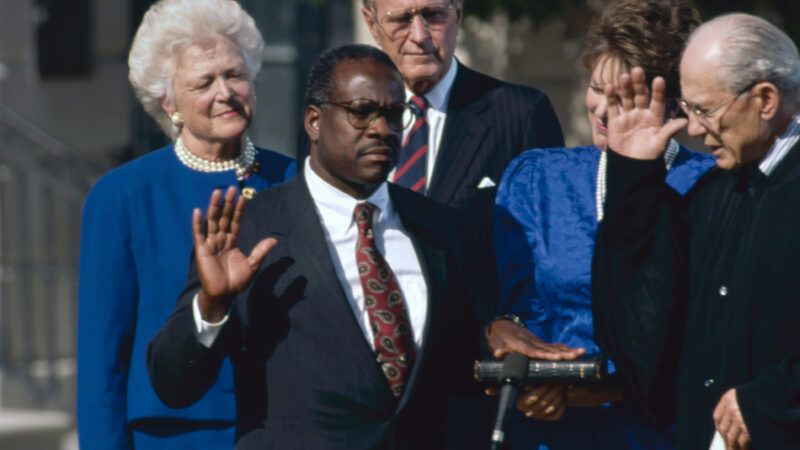The Clarence Thomas Court Is Good News for Gun Rights, Bad News for Criminal Justice Reform
Like it or not, the Thomas Court is here.

Throughout much of his career on the U.S. Supreme Court, Justice Clarence Thomas has been written off by liberal commentators as an intellectual lightweight who took his marching orders from Justice Antonin Scalia, his "apparent mentor," as New York Times legal pundit Linda Greenhouse once derisively put it.
To say the least, Greenhouse and the rest had no idea what they were talking about. In reality, it was Thomas who was quietly influencing Scalia in certain areas of the law, as Scalia himself repeatedly acknowledged. Thomas' critics underestimated him at their own peril.
The Supreme Court's recently concluded 2021–2022 term has driven that point home with a vengeance. On hot-button issue after hot-button issue, Thomas' views are now in ascendance. Like it or not, the Thomas Court is here.
And that is not even the whole story of Thomas' impact on American law. Think about it like this. There are several ways in which a judge can alter the legal landscape. One way is exemplified by the career of Justice Anthony Kennedy, a figure who was in the right place at the right time for a long time. A socially liberal/fiscally conservative type, Kennedy was perfectly placed on a closely divided Court to cast the tie-breaking fifth votes in several momentous cases, most notably the constitutional showdowns over gay rights. The judicial stars aligned in his favor and Kennedy now has his place in the legal history books.
Thomas, by contrast, has shaped the law by playing the long game. Over the past three decades, he has repeatedly staked out lonely positions—often writing in dissent but sometimes penning a solo concurrence—only to see many of his "extreme" positions ultimately become enshrined in law. What is more, generations of conservative law students, who have gone on to be conservative lawyers, lawmakers, and judges, have embraced many of Thomas' views as their own. Thomas' influence on the broader conservative legal movement will be felt for years to come.
The arrival of the Thomas Court is not exactly wonderful news for those Americans who would like to see every part of the Bill of Rights enforced with equal judicial vigor. Yes, Second Amendment advocates certainly have reason to cheer for Thomas, who is perhaps the most hawkish justice in cases dealing with the right to keep and bear arms. But First Amendment advocates have less cause to celebrate. As I have previously noted, "Thomas' recent statements in support of greater government control over 'digital platforms' such as Twitter and Facebook have somewhat tarnished his First Amendment bona fides."
And then there is the matter of criminal justice, an area where Thomas' jurisprudence has been quite deferential to police and prosecutors. Take his record on the Fourth Amendment. In Navarette v. California (2014), Thomas' majority opinion was blasted in dissent by none other than Scalia, who denounced Thomas' interpretation as "a freedom-destroying cocktail" that contradicted bedrock constitutional principles. It "is not my concept, and I am sure it would not be the Framers'," Scalia wrote of Thomas' opinion, "of a people secure from unreasonable searches and seizures." Not exactly the nicest thing that one self-professed originalist can say to another.



Show Comments (56)